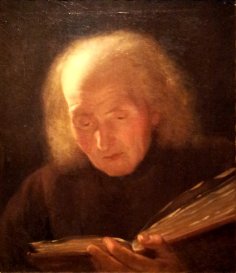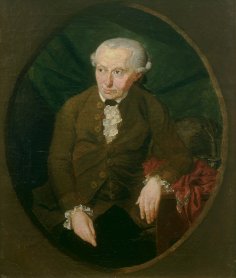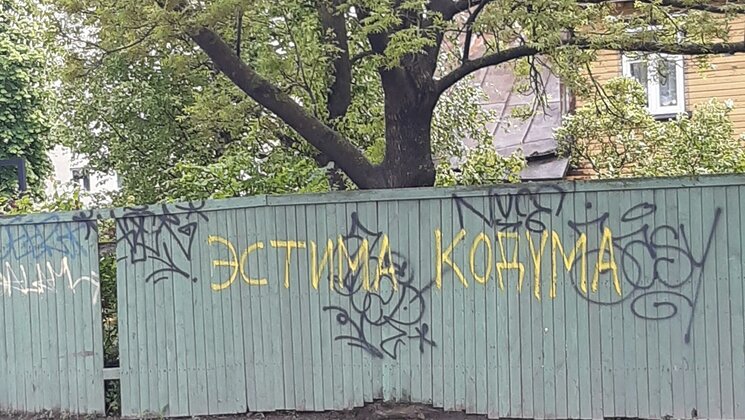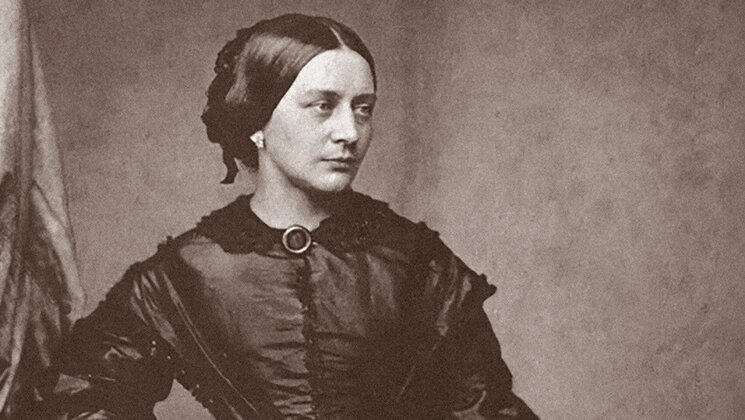Eva Piirimäe writes about her new book "Herder and Enlightenment Politics"
Eva Piirimäe, Associate Professor in Political Theory, has a new book published with Cambridge University Press entitled Herder and Enlightenment Politics.
In the following, Piirimäe explains the rationale for writing the book, Herder’s relevance in the Baltic context and the potential lessons for contemporary times.
Why did you decide to write a book about Johann Gottfried Herder? How did you get interested in his ideas?

Johann Gottfried Herder was an eighteenth-century German philosopher and theologian. There are several reasons why I got interested in his ideas, some more personal than others. First of all, he is perhaps the greatest philosopher who has lived in and written about the Baltic region (Herder spent his formative years in Riga). Second, he is also known in Estonia for his interest in the Estonian and Latvian folk songs and is remembered as a founding father of linguistic-cultural nationalism. Thirdly, as long as I remember myself, I have been interested in philosophy of history, both history as a process and historiography as writing about history.
Herder had interesting, original things to say about both. To bring just one example, he is rightly credited with having developed and theoretically analysed an ‘empathetic’ writing about history which would take seriously – and yet also try to bridge as much as possible in one’s research – profound differences between cultures and peoples’ ways of thought. Isaiah Berlin also made Herder’s moral philosophy look very interesting, arguing that in his ideas we can find a distinct approach to moral values – essentially a theory of moral or value pluralism which strikes a middle way between universalism and relativism.
However, I began serious research on Herder in connection with a different project. In my PhD thesis (defended at the University of Cambridge in 2006), I studied the philosophical origins of German nationalism in mid-eighteenth-century political debates and the political thought of Thomas Abbt (1738-1766). Abbt is not comparable with Herder in terms of his philosophical stature, but he was an original thinker who initiated a novel way of thinking and writing about politics. Abbt wrote two highly influential books about patriotism, one about dying for the fatherland, the other about living for the fatherland. Abbt’s thought shaped Prussian ideas about monarchy and monarchical patriotism, and one of the central claims in my dissertation was that he coined a specific idiom of aesthetic monarchical patriotism which laid the foundations for subsequent German nationalism. However, Abbt also influenced Herder, and I initially wanted to show how Herder’s ideas added a layer of linguistic-cultural nationalism to Abbt's ideas about monarchical patriotism. I wanted to turn my dissertation into a book and decided to write one more extra chapter, and that chapter was supposed to be about Herder. I began serious research on Herder and got totally carried away. On the one hand, I realised that I would not be able to do justice to Herder as a thinker in just one chapter. On the other hand, I also realised that in order to properly lay out the story of the genesis of German nationalism, its evolution should be traced much further into the nineteenth century. At the same time, while reading Herder, I was ever more deeply interested in what he was up to in his different writings. I thus turned away from my previous project and at some point, found myself writing articles, and soon also a book, specifically about Herder. This is a shame of course that I did not finish that earlier book. But there are good sides to it: it means that there is in fact an unfinished monograph somewhere in my old document folders. Who knows what will happen to it one day. I may return to it at some point. Indeed, I am now much better equipped to do research for and write the concluding part. However, I currently have many other research ideas, so I doubt that I will do so in the near future.
What is the book about more specifically?
In recent years, Herder has re-emerged as a powerful critic of Eurocentrism and European colonialism and imperialism. His republicanism has also been recognised in a number of studies. Nevertheless, in previous scholarship there was hardly any discussion of his ideas on European politics and the challenges of Russia, France or his native Germany (the Holy Roman Empire). It was still rather unclear whether Herder can be regarded as a serious political thinker at all. His influence on the national awakening of small nations in Southern, Northern and Eastern Europe has of course long been recognised, but there was still considerable ambivalence as to what his own concerns and agenda were. I hope my book helps to clarify these questions.

Methodological considerations also played an important role in my choosing this topic. In existing studies, Herder’s political ideas were often treated as forming one systematic whole or at least as evolving mainly due to the unfolding of his deeper metaphysical and epistemological views. The fact that he was also a voracious reader and perceptive commentator on contemporary events and political problems was largely ignored. In my study, I wanted to understand his political concerns and contributions to current, i.e. Enlightenment political debates. I do not deny that he was very interested in metaphysics, epistemology and philosophy of language. However, at least partly, his metaphysical, epistemological, linguistic and literary explorations resulted from deeper political questions – for example the question how we can align laws more closely with ethics. Answering this question requires delving deep into philosophical anthropology. More generally, I believe that this kind of contextual approach enables us not only to better capture an author’s views, but also provides a new angle from which to explore the reception of their ideas, including their contemporary relevance.
What are the major findings of the book?
I show in my book that Herder was deeply interested in the potential for cultural, moral and political reforms in Russia, Germany, and Europe. He very well understood the various challenges of modernity – heightened individualism and international rivalry – asking deep questions about the desirability and feasibility of patriotism in modern societies. A ‘purified’ form of patriotism was his solution to these challenges. Indeed, patriotism is a theme that is running through his work, but so is also individual human self-determination. Interestingly he published two different essays with the same title “Do we still have the public and the fatherland of the ancients” – only there was thirty years between them (1765 and 1795). In his mature years, he was also very interested in the international implications of patriotism, asking questions about the ways in which it would be possible to prevent patriotism from turning into a ‘national delusion’, an overly self-centred and potentially aggressive view of national greatness. A related question for him concerned the foundations of international peace: what kinds of institutions are needed to achieve it and what kinds of moral sentiments should ground these institutions?
One of my methodological assumptions, as already indicated, is that we should not impose anachronistic interpretative frames on historical ideas. I believe ‘nationalism’ is one such frame which should better be avoided in interpreting Herder’s ideas. It is not just a strongly loaded academic term but is understood very differently in different national contexts. Also, it obfuscates Herder’s own concerns and agenda. He was successively a patriot of Riga (and to some extent Russia), a German patriot, but also someone who sought to advance peace and Humanität in Europe and beyond. Instead, I thus suggest that the best way to identify Herder’s precise ideas is to trace the ways in which he sought to contribute to contemporary debates. For example, he initially was a follower of Rousseau, but soon was put off by the latter’s critique of natural sociability. Herder also intervened into a debate about freedom and patriotism in modern republics and monarchies, in which he defended modern monarchies against
Rousseau. Convinced about the need to ground new legislation in ethics, he soon found himself criticising the misguided applications of Montesquieu’s theory of monarchy by Russia’s Empress Catherine II. He was also highly critical about German history and the idea of ‘German freedom’. In his mature years, Herder wavered between optimism and pessimism regarding the future of Europe, whereas these varying visions, in turn, were to a large extent grounded in his changing assessments of the dynamics of human history and particularly that of Europe, or more specific peoples and states in Europe.

In the 1780s and 1790s, he got involved in a protracted debate with his erstwhile mentor in Königsberg, Immanuel Kant. He severely criticised Kant’s support for modern monarchies, qualifying the latter as ‘state-machines’. Indeed, one the most consequential of his ideas was the prediction of the collapse of the European state-machines due to the gradual emancipation of ‘subjugated peoples’, which he in turn associated with the rise of modern commerce and the growth of ‘Humanität’, humane ways of thought in human history. From this he derived an instigation to current rulers to commit themselves to reforming the ‘near-dead’ political institutions of their realms. In the French Revolution period he further sharpened his understanding of human self-determination, contrasting it directly with Kant’s account of autonomy. Equally important, he came up with a novel understanding of the self-determination of peoples, being sympathetic to the French attempts at their ‘self-constitution’ as well as guarding against the French republican imperialism. Although he made clear that the precise French models of revolutionary government could not (and did not merit) being copied, the German ‘public’ had to find a way to achieve self-government, and indeed, constitute itself as a modern polity. Here, his assessment of the pivotal role of the European cities in contributing to the rise of modern liberty was central. In his later period, he also advocated a vision of Europe as a commercially and culturally interconnected community of peoples, one modelled on the Hanseatic League.
What kind of inspiration did Herder provide to his followers in subsequent periods?
The book concludes with an Epilogue which sketches the reception of Herder’s political ideas in various European contexts, including, first of all, Germany, but also in the Baltic region. I argue that very different – indeed, rivalling – political thinkers and movements could invoke the authority of Herder to justify their reform proposals – various kinds of liberal, socialist, and anarchist thinkers found inspiration in him. At the same time, there is little ground for associating Herder with any form of self-centred exclusive nationalism. Although there have been attempts to present Herder as a forefather of a distinctively ‘German’ conception of Volk and even ‘Nationalstaat’ (a concept often connotating a ‘Machtstaat’ in German linguistic usage), he himself never advocated racial (or even extreme linguistic-cultural) purity, let alone encouraged aggressive pursuit of international power. Some lines of the appropriation of his ideas are more justified than others.
In the Baltic context, Herder’s ideas were invoked by various liberal-minded Baltic Germans defending the local German-language administration and culture as well as supporting the federalisation of the Russian Empire, just like his ideas about the importance of language and culture for individual moral integrity, human self-determination and local self-government served as an inspiration for the national movements in the Baltic provinces. At the same time, it is an exaggeration to view him as advocating something like secession or the creation of national states – in his vision, the emancipation of peoples was to lead to the formation of a new kind of transnational order in Europe.
Are there any lessons also for contemporary times?
I would be wary of framing the yield of the book as a set of lessons for contemporary times. There is no point in writing a thick contextual study to say that a thinker was an architect of the European Union avant la lettre. Rather, this kind of endeavour makes sense if we are genuinely interested in capturing the ways in which the author grappled with important moral and political dilemmas of his age. However, by thus taking seriously the concerns of an historical author, we can also explore in depth the ways in which he sought to solve them. To some extent, the goal is thus to learn to see the world through the eyes of an author (an ‘empathetic’ endeavour Herder himself theorised and recommended), so as to enrich our understanding of the complex evolution of our current political vocabularies and ways of thought. Thereby we also gain a new perspective on our own frames of reference.
Pondering the fact that it is possible to refer to one and same author as initiating seemingly distinct ideologies (e.g. in Herder’s case, liberalism, socialism, anarchism, nationalism, cosmopolitanism, multiculturalism), we detect connections and common ground that might otherwise eclipse from our view. For example, by engaging with Herder and his reception history, we can explore and recognise the links between certain types of linguistic-cultural nationalism, multiculturalism, and cosmopolitanism. We can also appreciate those between culture, ethics, law and politics more generally. Indeed, engagement with Herder helps to bring to sharp relief that we still deem it a relevant consideration that laws and institutions should be grounded in ethical/civic sentiments and principles, and that we still continue to debate whether these principles should be politically created or should evolve somehow independently in cultural communication with, and self-distanciation from, other groups (or whether we in fact can at all differentiate between these forms of identity-building). We also value the self-determination of cultural peoples, whereas it is unclear whether and when it can legitimately translate into claims to independent statehood and what it entails about the constitution of that state.
However, as Herder himself shows, these claims do not exclude thinking about deeper underlying political values of a community. In some sense Herder is a clear example of a ‘constitutional patriot’. He also makes many perceptive and still relevant observations. For example, Herder draws attention to the fact that culture and patriotism can be instrumentalised by political leaders and rivalling parties, pointing at a number of instances of this kind of strategic action in his time. He also offers advice on how to create effective counterstrategies to it, mainly putting his stakes on a new kind of reflective and humane historiography (which he sharply contrasts with Kant’s teleological approach). However, for some reason his warnings and advice did not have much of an impact. Instead, the instrumentalisation and securitisation of culture reached its apogee in the late nineteenth century and the first decades of the twentieth. Of course, it still is still widespread, and perhaps should be recognised as an inescapable part of modern politics. We may thus want to continue asking why it is so and whether there are any (partially effective) antidotes to them. This leads us to new explorations.







